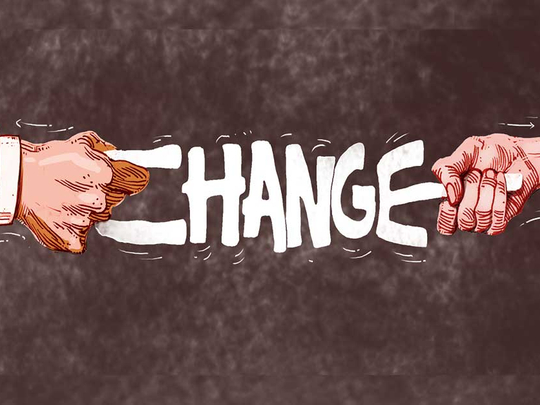
There is nothing unusual about an American politician running under the banner of ‘change’. George W. Bush promised to restore dignity to the White House. Bill Clinton echoed his political hero, John F. Kennedy, by emphasising youth and the idea of a new generation claiming its turn to lead. Another relatively young politician, Barack Obama, built his entire campaign around the slogan “hope and change”.
This year, American voters are presented with the choice between a 70-year-old man and a 68-year-old woman, both promising to deliver “change”. What emerges is a kind of ideological Rorschach Test, the answer to which says less about what can and cannot be accomplished than it does about the individual voter and the form of change he or she wants to see.
It is a choice with huge implications for the wider world in general and the Middle East in particular, because the different varieties of change promised by Donald Trump and Hillary Clinton will have vastly different implications for allies and foes alike.
Trump’s core constituency consists of angry white men without a university degree, but those are far from his only supporters. Ask the less angry Trump-backers what attracts them and over and over again one hears about gridlock in Washington and the need to shake things up. Trump, they say, is a successful businessman who will ‘do deals’ by forcing his will on stubborn and lazy political professionals (setting aside the apparent contradiction between ‘doing deals’ — a phrase implying compromise — and the desire for Trump to knock heads together).
At last month’s Republican National Convention, Trump portrayed himself as someone uniquely qualified to clean up a corrupt political system because as a longtime donor to candidates of both parties, he knows exactly how influence-buying works. “I alone can fix it,” he told the crowd, and a national TV audience. It was an appeal aimed squarely at voters who believe that only a political strongman can end Washington’s era of partisan trench warfare.
Hillary accepts that partisan differences will be with Americans always. She has built a career by working within the system and slowly, doggedly, pushing forward, each small victory, laying the groundwork the next.
“Life in the real world is complicated and real change is hard. And a lot of people even think it’s boring,” Bill Clinton said last month when addressing the Democratic Convention. But the real Hillary, he said, “had done more positive change-making before she was 30 than many public officials do in a lifetime in office.”
Here is another way of looking at this dichotomy: Trump promises disruption, but offers no real guarantee of progress. Hillary promises constant effort, probably a few victories, but little in the way of dramatic results.
On the global stage, a Hillary administration will represent a continuation of the status quo. A Trump administration, at the risk of stating the obvious, promises to be something else entirely.
So the question those who care about the Middle East have to ask themselves is what kind of change-maker will be best for the region? The inherently cautious Hillary, who will push for international consensus but is unlikely to shake things up? Or Trump, guided by the belief that diplomacy is essentially a business transaction in which foreigners pay for American help?
Hillary, like her former boss, Obama, has been criticised for having no comprehensive plan for dealing with either Daesh (the self-proclaimed Islamic State of Iraq and the Levant) or the region’s refugee crisis. More air strikes, arming fighters opposed to Daesh and the regime of Syrian President Bashar Al Assad — and they may not make things a lot better. But they are unlikely to make them dramatically worse.
Trump, in contrast, promises that “we’re gonna beat [Daesh] very, very quickly”, but refuses to say how (he claims to have a plan, but will not reveal it because “I’d rather be unpredictable.”). He rarely mentions Syria beyond vowing to let none of its refugees into the United States.
In the abstract, what Trump promises may be emotionally satisfying, but global affairs rarely lend themselves to quick and easy solutions. In the Middle East, in particular, strong leaders trying to impose their will on the region have historically been the cause of a lot of grief.
Some Trump supporters embrace disruption, arguing that in domestic and international affairs alike what America needs now is a tough guy who brooks no arguments. Others insist that Trump’s swagger is an act for public consumption and that as president, he would tone things down and be guided by more knowledgeable advisers.
That may turn out to be true, but it’s a huge risk to ask both America and the wider world to take. Hillary may be dull and conventional, but given the alternative that is not necessarily a bad thing. Both candidates promise “change”, but in this year’s American presidential election, it’s the Democrat who is the real conservative.
Gordon Robison, a longtime Middle East journalist and US political analyst, teaches political science at the University of Vermont.









